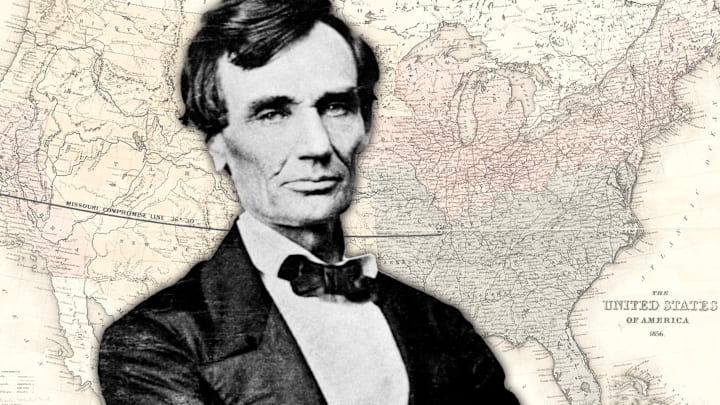On June 16, 1858, a beardless Abraham Lincoln took the stage at the Illinois State Capitol in Springfield to formally accept his nomination for U.S. senator on behalf of the state’s freshly formed Republican Party.
In a short speech whose fame might rival that of the Gettysburg Address, the future president warned the “gentlemen of the Convention” that the country’s divided stance on slavery could only lead to civil war.
“‘A house divided against itself cannot stand,’” Lincoln declared. “I believe this government cannot endure, permanently half slave and half free.”
These prophetic words come from the Book of Matthew in the New Testament, in which Jesus informs the Pharisees that “Every kingdom divided against itself is brought to desolation, and every city or house divided against itself will not stand.” They now rank among the most iconic in the history of American politics.
But while the phrase has since been quoted by countless politicians in and outside the U.S., and went on to inspire popular TV shows like HBO’s House of the Dragon (which also revolves around a civil war), its original meaning is not as obvious as one might think.
What “A House Divided” Really Means
A common misconception about the House Divided speech is that Lincoln believed the Union would destroy itself as a result of its inability to regulate the spread of slavery. This is not the case, however. “I do not expect the Union to be dissolved,” Lincoln stressed. “I do not expect the house to fall—but I do expect it will cease to be divided.”
Cessation would come through civil war: a resolve by Northern and Southern leaders to settle through combat what they could not agree on in conversation. A succession of ineffective and hotly contested laws—including the 1820 Missouri Compromise, which outlawed slavery in parts of the recently acquired Louisiana Territory, among other actions—indicated to Lincoln that the pro-slavery elements of U.S. society could not coexist under the same roof as abolitionist elements.
If the house—the Union—was to remain intact, one side had to subjugate the other.

In 1858, three years before Confederate troops opened fire on Fort Sumter in the harbor of Charleston, South Carolina, Lincoln did not yet know which side would ultimately emerge victorious. Still, he knew there could only be one successor.
“Either the opponents of slavery, will arrest the further spread of it,” the future president proclaimed, “and place it where the public mind shall rest in the belief that it is in course of ultimate extinction; or its advocates will push forward, till it shall become alike lawful in all the States, old as well as new—North as well as South.”
In addition to formulating a vision of the future, Lincoln’s House Divided speech takes aim at his senatorial rival, the incumbent Democrat Stephen Douglas. Whereas Lincoln advocated for federal control over the spread of slavery, thus maintaining the balance of power outlined by the Missouri Compromise, Douglas championed popular sovereignty, the idea that new territories should be able to decide for themselves whether slavery would be legal within their borders.
Lincoln’s thoughts on popular sovereignty—a system which, it should be noted, only took into account the votes of white, landowning men—were greatly influenced by the Dred Scott decision, the outcome of a case brought to the U.S. Supreme Court a year prior. Scott and his wife Harriet, an enslaved Black couple, sued for freedom when their enslavers took them from Missouri, a state where slavery was legal, to Illinois, a place where it was not.

When the Supreme Court ruled in favor of Scott’s enslavers, it essentially opened the door for Southern slaveholders to take people they enslaved into free territories. This move convinced Lincoln that the balance of powers could not be maintained, and that the entire U.S. would soon end up either permitting slavery or outlawing it altogether.
“We shall lie down pleasantly dreaming that the people of Missouri are on the verge of making their state free,” he declared, referencing both Scott and Douglas, “and we shall awake to the reality, instead, that the Supreme Court has made Illinois a slave State.”
Lincoln’s Legacy
Although Lincoln lost the senatorial race to Douglas, his House Divided speech, and the equally publicized Lincoln-Douglas debates that followed paved the way for Lincoln’s successful presidential campaign in 1860. Running against Unionist John Bell and Southern Democrat John C. Breckenridge, the more charismatic and well-versed Lincoln won the White House with 180 electoral votes—dwarfing the 12 procured by Douglas, who also ran for office on the Northern Democratic ticket.

Lincoln’s oratorial eloquence was rivaled only by his clairvoyance. As foretold, the U.S. readily descended into civil war after his inauguration, resulting in the abolition of chattel slavery following the ratification of the Thirteenth Amendment in 1865.
At the same time, one could argue that Lincoln’s house remained divided. Following the Civil War, former enslavers obstructed Reconstruction-era policymaking in the South. Instead of properly integrating formerly enslaved people into society, new structures were put in place to prolong their systemic oppression. These means ranged from sharecropping—a form of servitude that differed from antebellum slavery only in name—to racial segregation, a policy that continued until the civil rights movement of the 1950s and 1960s.
As a democracy with only two consequential political parties, the U.S. has repeatedly teetered on the edge of civil unrest. When tensions flare, commentators and candidates regularly echo Lincoln’s famous words. Now, all they need to do is listen to them.
